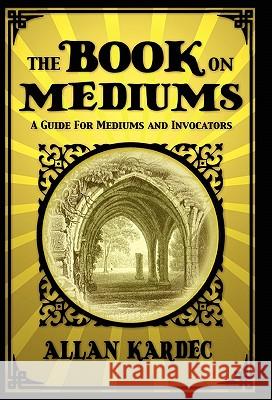The Book on Mediums: A Guide for Mediums and Invocators » książka
The Book on Mediums: A Guide for Mediums and Invocators
ISBN-13: 9781907661778 / Angielski / Twarda / 2010 / 448 str.
The Book on Mediums: A Guide for Mediums and Invocators
ISBN-13: 9781907661778 / Angielski / Twarda / 2010 / 448 str.
(netto: 130,98 VAT: 5%)
Najniższa cena z 30 dni: 135,66
ok. 16-18 dni roboczych.
Darmowa dostawa!
The Book on Mediums, also known as The Mediums Book, was written by Allan Kardec and originally published in 1861. It is the widely respected follow up to The Spirits Book which was published in 1857 and is the second in a series of five books that Kardec wrote that are collectively known as the 'Spiritist Codification'. In the 1850's, whilst investigating the afterlife, Kardec communicated in seances with a collection of spirits named 'The Spirit of Truth' who discussed many important topics such as life after death, good and evil, the nature of the universe, the origin of spirits, and many other subjects. The Spirit of Truth' allegedly counted many of history's great thinkers amongst its number such as Thomas Aquinas, Voltaire and Augustine of Hippo. Over time and after several sessions with the group Kardec had gathered enough information to convince him of life after death and he was compelled to spread the teachings of 'The Spirit of Truth'. He 'codified' their comments and listed them as answers to questions and this forms the content of his teaching. The Books on Mediums is intended to be an essential guide to mediumship for mediums and those interested in the spirit world. The book covers the different types of mediumship including, table-turning, incorporation of spirits, haunted houses, transfiguration, apparitions, psychography and telekinesis. It explains how to deal with manifestations and how to guard against frauds, charlatans, and skeptics alike. The book warns against the perils of un-guided mediumship, possession, and obsession that often go hand in hand with the beautiful revelation that spiritual communication can reveal. Some of Kardec's advice found in the book include; "Do not believe the spirit to be who he purports to be unless there is evidence supporting his claim, but even then, wait till others confirm what one has said." "Do not judge the spirits by their purported names, but by the quality of the morals and the philosophy found in their communications." "Do not let yourself be too entertained with the evocation or incorporation of spirits enough to disregard what is more important, like living your own life and helping your neighbour." "Do not live by the spirits' advice: the communications from the spirits are to be studied and revered - but they should not be taken as the word-by-word expression of the ultimate truth." "Do not judge the quality of the communication by the culture or the social status of the medium by which it was brought." As the New Testament states; Test the Spirits dear friends, do not believe every spirit, but test the spirits to see whether they are from God, because many false prophets have gone out into the world. 1 John 4:1











